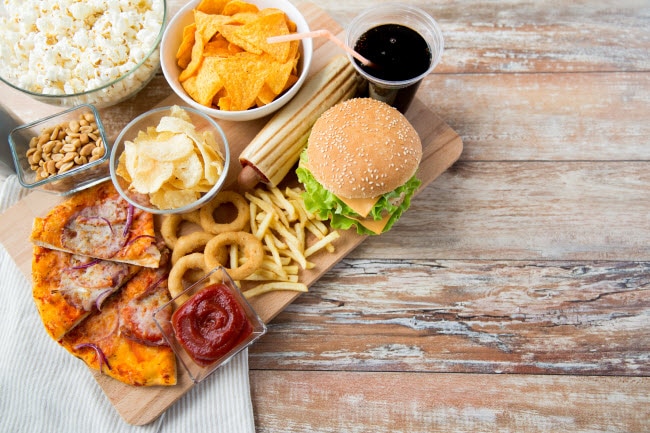As the name suggests, junk food is unhealthy—favorites like potato chips and chocolate chip cookies are typically loaded with calories, fat and sugar.
Making matters worse: Mounting evidence points to junk food being addictive. For instance, a new study by researchers at the University of Michigan shows people trying to cut junk food from their diets suffer short-term withdrawal symptoms similar to those experienced by addicts who are trying to quit using drugs. Those symptoms include sadness, irritability and fatigue.
While you might not be able to avoid those symptoms when you’re striving to dump junk food, you can ease the process. Nutrition professionals offer these nine tips for trashing your junk food fixation.
1. Figure out your triggers.
Molly Sommerhalder, a certified wellness coach with the International Association of Wellness Professionals, suggests examining why you pick junk food over healthy food. Are you rewarding yourself? Are you stressed? Are you feeling bored or lonely?
“This will help you look at why you have chosen a certain food,” Sommerhalder says, “and how you can retrain yourself mentally to find other stress-relief habits or ways to reward yourself.”
2. Start slowly.
Begin by replacing just one snack with a healthy option — swapping crunchy snack chips with crunchy carrots, for example. Once you’ve conquered that, move on to replacing another bad item with a good item until you’ve cleared your plate of most, if not all, junk food.
“It is best to slowly make changes so you stick with them. Otherwise, you might revert back to your old habit,” Sommerhalder says.
Registered dietitian nutritionist Summer Yule says it’s usually more sustainable for people to take small, rather than big, steps toward goals like giving up junk food.
“What the overall dietary pattern looks like over time is more important to health than having a ‘perfect’ day. Consistency is key, not perfection,” Yule says. “Reducing portions of the less healthy options and being more moderate about intake are good initial steps for many.”
3. Map out a plan.
Just as you should establish a budget to determine how you spend your money, you should establish a plan to determine how you spend a modest amount of junk food calories.
“Setting clear boundaries can help you gain control over your junk food habit and still allow some room for a treat now and then,” registered dietitian Suzanne Dixon says. “Nobody needs to completely swear off junk food, but cutting back can have significant benefits to your health.”
4. Switch from bad to good.
Look for ways to satisfy your cravings without sacrificing your health.
If you gravitate toward salty snacks, registered dietitian Nicole Hinckley recommends substituting heavily salted snacks with something like lightly salted popcorn. Have a sweet tooth? Grab a piece of dark chocolate or a piece of fruit.
5. Alter your environment.
Want to eliminate the temptation to indulge in junk food? Keep it out of your home, Dixon recommends. Ditch the typical excuses like “My kids are always begging for snacks” or “My husband really likes ranch-flavored tortilla chips.”
“If it’s not there,” Dixon says of junk food, “you can’t eat it.”
6. Take healthy snacks with you.
Buy or assemble small packets of nuts and dried fruit. Keep apples, bananas and other portable fruit on hand. Stock the fridge with yogurt cups and individually wrapped string cheese.
Then, before you head out the door, stash a couple of those snacks in your purse or backpack.
“Be ready for hunger wherever you are,” Dixon says. “If you have something to tide you over until you can get home and make a meal, you’re less likely to hit the fast food drive-through. Don’t think of it as wasted or extra calories. Think of it as quality control for your entire dietary pattern.”
7. Know when to shop.
If you’re tired, irritated or hungry when you shop for groceries, you’re more likely to make emotionally charged or physically driven — and bad — choices, according to Dixon, and throw junk food in your cart.
Instead of reaching for cookies or candy in the grocery aisle, try dealing with your emotional needs by taking a walk, horsing around with your dog or relaxing in a bubble bath, Dixon recommends. Or if you must curb your hunger at the grocery store, commit to searching for a healthy snack.
8. Don’t skip meals.
Maintaining a proper schedule for meals and snacks helps regulate your blood sugar level throughout the day and enables you to pick better foods, registered dietitian nutritionist Maria-Paula Carrillo says.
9. Discover a new hobby.
Have you always wanted to be an amateur photographer? Grab your camera and shoot! Are you itching to do some knitting? Pick up some yarn and needles, and create that quilt!
“Snacking sometimes accompanies boredom. Find something fun that you can do that will keep your mind from thinking about that junk food,” Hinckley says.




